(A wrap-up of the 2017 Charroux Literary Festival):
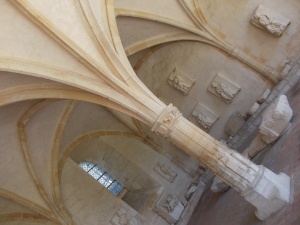 Have you ever been to a series of unrelated performances and found that a common theme emerges?
Have you ever been to a series of unrelated performances and found that a common theme emerges?
This is exactly what happened at this year’s Charroux Literary Festival, and I wasn’t the only one to notice an intangible thread weaving through the author talks. See if you can spot it from my summary below.
So, for this second edition of the Charroux festival I was a speaking author, which meant I was invited to the pre-festival dinner (ah, the joys of fame!).
I was so excited about meeting everyone that I arrived a few hours early and had plenty of time to walk around the medieval village. This included discovering the fascinating abbey ruins where I dawdled among the spirits of times past.
I also came across the house where French writer Robert Charroux lived, and learnt that he was a pioneer in Ancient Astronaut theories: the pseudoscientific theories that suggest aliens visited Earth in antiquity and prehistoric times.
I knew I wouldn’t have a spare minute for contemplation once the festival began – and I was right. Even without the festival, Charroux is a superb destination for a day’s exploration (and I’m not just referring to the pub that has Guinness on tap).
During the 3 days, I went to 4 talks involving historical authors Barbara Erskine, Tracey Warr, Alison Morton (Roma Nova) and James Vance (World War II). I’ve never been tempted to write historical fiction because I know nothing about history and would be afraid of getting everything wrong. But the discussions I heard helped me understand why writing historical fiction can be so alluring.
 For Tracey and Barbara, who write about the medieval period, there is very little documentation. We know what the historical figures did but we don’t know why they did it and how they felt about it.
For Tracey and Barbara, who write about the medieval period, there is very little documentation. We know what the historical figures did but we don’t know why they did it and how they felt about it.
This means that joining the dots to create a picture of events leaves plenty of room for imagination – which is exactly what novelists like to explore: in other words, the ‘unknowability’ of the past, as Tracey quoted.
Even the facts themselves can be dubious: there isn’t just one story about what happened, there are many stories – and bards and pilgrims played a role in this as they passed on news orally. The difference between Welsh and English records for the same events are a good example of this.
All four authors talked about being conscious of the past when they visit historical places, as well as the importance of imagining their characters going about their daily life in those places. Barbara added that it’s as if the past is trying to get through to the present, an idea she explores fully in the ghostly elements of her fiction.
Nick Inman, author of Mystical France, talked about the idea of science being able to explain how mystical symbols and sculptures were created, but not being able to explain why it was done. He suggested using your intuition when you visit ancient places to try to find your own answers.
He has done this over the last five years, and he captivated his audience with the slideshow of mystical symbols and sculptures he has collected during his travels around France. No wonder so many people surged forward to buy his book after his talk.
Not quite so many people rushed to buy Tree Magic after my session about the road to publication, even though a major theme is how science can’t explain certain spiritual aspects of life. I guess I have some lessons to learn from Nick Inman there. But I did sign plenty of copies and get some great feedback – and nobody actually fell asleep.
The talk that created the most discussion was Mike Welham’s presentation about mixing fact and fiction. His novels are based on events that have never been satisfactorily explained; for his chosen themes, he has researched and summed up all the mysterious inconsistencies to suggest huge cover-up operations, which he has published as fiction.
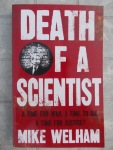 He presented his conspiracy theories about frogman Buster Crabb, The World Trade Center Building 7 and David Kelly’s death. We were lucky to have Andrew Lownie, an author who has spent decades researching Guy Burgess, in the audience, as well as TV and Foreign Office specialist Jane Lythell. Their points of view as experienced researchers added to the charged atmosphere during the session.
He presented his conspiracy theories about frogman Buster Crabb, The World Trade Center Building 7 and David Kelly’s death. We were lucky to have Andrew Lownie, an author who has spent decades researching Guy Burgess, in the audience, as well as TV and Foreign Office specialist Jane Lythell. Their points of view as experienced researchers added to the charged atmosphere during the session.
The common thread (have you spotted it yet?) didn’t reach all the creaky-floored rooms of the Maison Charlois during the festival, as the sessions on the craft of writing had nothing mystical about them (although you could argue that the whole writing process is rather mysterious).
This category of talks included a useful analysis of humour with Chuck Grieve; a detailed session on playwriting with Gordon & Jocelyn Simms; an exploration of character and an insight into psychological thrillers with Jane Lythell (what a lovely lady); and workshops with Vanessa Couchman.
I talked about writing for Young Adults and persuaded my audience to wield their pens – which produced some promising beginnings.
There was also a New Writers Workshop, chaired by Susie Kelly and including Jane Lythell, myself, Alison Morton and Blackbird publisher and author Stephanie Zia. This was an interactive event in which we all gave our advice for new writers and then circulated among groups to answer questions.
- photo by Susie Kelly
The author talks are, of course, central to the festival and I wish I’d been able to find a Harry Potter time turner so I could attend them all – both French and English. But they were far from being the only element to the three magical days in Charroux. The other elements came from the festival supporters.
There’s nothing like having a drink or a meal with other festival-goers; or having a laugh with the lovely ladies of the Hope Association tea tent, who delivered a constant supply of drinks, English food and good humour. Cheerful volunteers were everywhere, from the helpful people at the reception desk, in the bookshop and at the Enfants de la Rue charity stand, to the behind-the-scenes drivers and hosts. It was great to see so many familiar faces and make new friends.
But my biggest thanks have to go to Kate and Chris, the festival organisers, who made this all possible. Did they create the mystical thread on purpose, or is it just in my head?
Charroux 2019 seems a long way away. Luckily, we have the 2017 edition of another intimate literary festival full of interesting people in October: Parisot. Perhaps I’ll see you there?

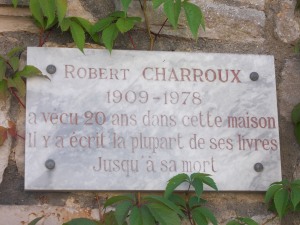
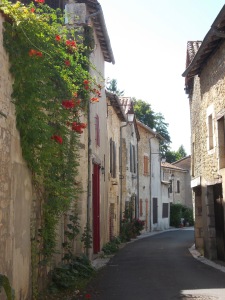
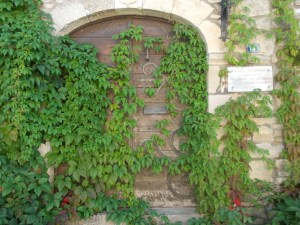
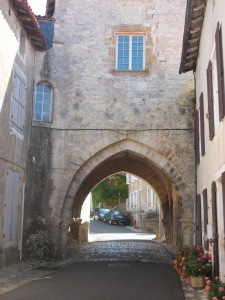
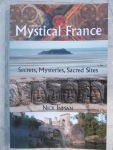
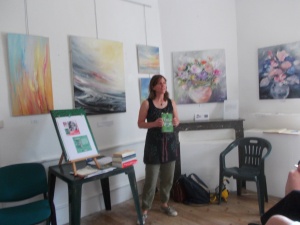
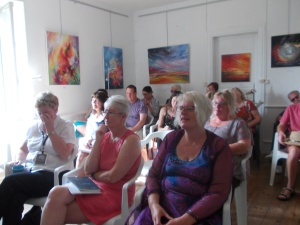
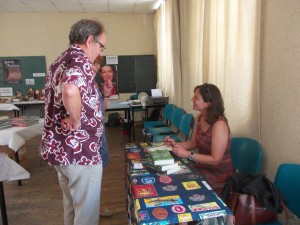
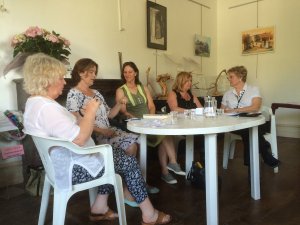
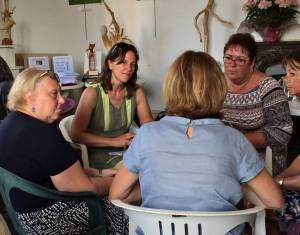
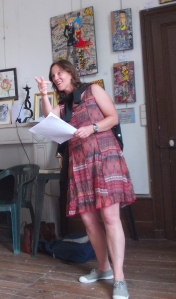
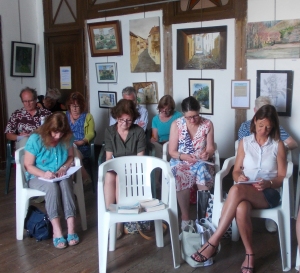
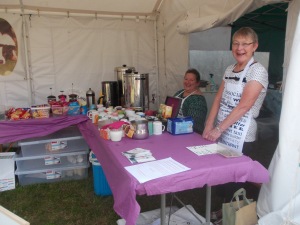
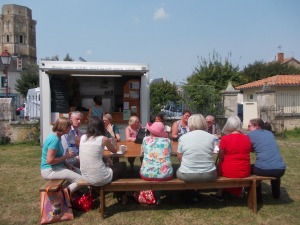
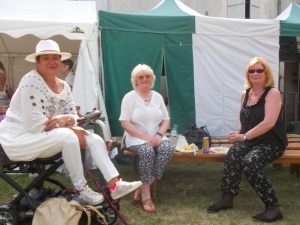
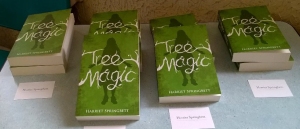
Thank you, Harriet, for your contribution to the Charroux Litfest and your excellent account of the event. Metaphysical and mystical, elements to fire the imagination were definitely at work. i appreciated the 5 minute meditation led by Stephanie Zia before the workshop given by Diana Morgan-Hill, ‘Writing from the Heart,” to let go the busy mind, allowing awareness to awake.
The 3 days emmersion in Charroux with like minds and brilliant speakes/authors were extraordinary. May I join you in thanking Kate and Chris for their brilliant organisation, support and generosity in staging the Festival.
LikeLiked by 1 person
I would have gone to Diana’s workshop if I’d managed to get my hands on that time turner. Thanks for telling me what it was like and for dropping by, Jackie.
LikeLike
It was an interesting and stimulating three days. And you’ll certainly see me at Parisot!
LikeLiked by 1 person
Looking forward to it already, Vanessa. Must book…
LikeLike
Sounds like a fun and fascinating event! It’s every two years then? I must try and make it next time…
LikeLiked by 1 person
Yes, Curtis. The next one will be in 2019 (if the organisers have recovered by then!). It would be lovely to meet you there.
LikeLiked by 1 person
What a lovely post Harriet.
It was great to meet you and I loved the warmth and informality of the festival.
LikeLike
Hey, Jane! Thanks for dropping by. It was great to meet you too, and I hope we’ll keep in contact. Good luck with all things bookish and I look forward to bumping into you at another festival one of these days.
LikeLike
This sounds like so much fun – I would have really enjoyed the theme too. Maybe I’ll try to make it next year. In the meantime, I’m off to a writers festival in York, UK tomorrow and really looking forward to it. Hope it’s as great as yours was.
Oh, and congratulations on being a speaker – that’s quite an honour. I’m just an attendee at mine…
LikeLike
Pingback: Readers, writers and arithmetic for authors and storytellers searching for readers at literary festivals in France - Ruth Hartley
Loved this post – and I’m off to find a copy of Mystical France now x
LikeLike
Thanks so much, Jules. I hope you enjoy reading Mystical France.
LikeLike
Pingback: One Year On | Harriet Springbett's playground